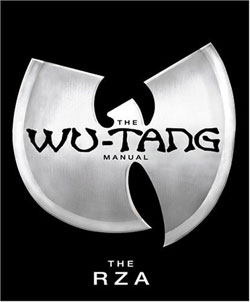 | |
| Author | RZA Chris Norris (co-writer) |
|---|---|
| Language | English |
| Genre | Music |
| Publisher | Riverhead |
Publication date | October 2004 [1] |
| Publication place | United States |
| Pages | 243 |
| ISBN | 1-59448-018-4 |
| OCLC | 260048684 |
| 782.421649/092/2 22 | |
| LC Class | ML421.W8 R9 2005 |
| Followed by | The Tao of Wu |
The Wu-Tang Manual is a guide to the Wu-Tang Clan written by prominent member and producer RZA as well as Chris Norris. [2] The manual explains Wu-Tang terms, Wu-Tang members, merchandise, movies and inspirations.